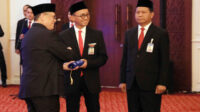- Gen Z consumers in APAC say they are willing to pay a 28% premium for luxury brands that prioritise sustainability initiatives
- 93% of APAC luxury consumers are willing to support or spend more on luxury brands that actively promote and communicate their sustainability initiatives, yet close to one-third of Hong Kong and Southeast Asia consumers claim they lack sufficient knowledge about their favourite brands’ efforts in this domain
- Luxury consumers in APAC ranked a brand’s values, real-world impact and sustainability initiatives on par with the brand name when making purchasing decisions

HONG KONG SAR, Warta9.com – 30 November 2023 – A recent survey commissioned by leading luxury and sustainable packaging specialist, Delta Global, shows that environmental awareness is on the rise and is increasingly impacting how consumers shop for luxury goods.
The comprehensive study titled “Navigating a Greener Future” was conducted in August 2023 by HK-based market research firm inspiring-i and surveyed over 2,000 luxury consumers from Gen Z to Gen X (ages 18–55) across Hong Kong, Australia, Malaysia, Singapore and mainland China. It delved into the impact of sustainability on luxury consumers’ purchasing behaviours – particularly among Gen Z and Millennials, who will emerge as the biggest luxury consumers by 2030[1].
The study revealed that sustainability commitments have a tremendous impact on brand loyalty. The majority of interviewees said they would stop buying or buy less from a brand that does not care about its environmental impact. It also found that trends such as shifting purchases to more sustainable brands and buying or selling pre-loved luxury goods are growing across APAC, especially among Gen Z consumers.
“There is a perception that the luxury consumer in APAC is less knowledgeable and less concerned about environmental and sustainability issues compared to their European and US counterparts. Our survey revealed that environmental awareness is accelerating amongst luxury consumers in APAC. This is especially true for China where not only has the government been implementing specific environmental protection policies over the last 10 years, but where consumers have experienced the detrimental effects of climate change on their health first-hand.”
“Additionally, from a demographic perspective, luxury brands that don’t prioritise sustainability initiatives will need to consider how this might hamper efforts to attract Millennials and Gen Z consumers, for whom environmental sustainability is a core consideration. This survey was conducted to help luxury brands better understand their customers’ perceptions and decision-making processes and, in turn, empower them to implement sustainability initiatives that are good for the planet, good for people and good for their bottom line,” said Robert Lockyer, Founder & Chief Client Officer of Delta Global.
Heightened environmental awareness and the impact on the luxury dollar
A key finding of the study is the heightened environmental awareness among luxury consumers, with more than 90% of respondents claiming to be more environmentally conscious than they were two years ago. 42% claimed to be “a lot more aware” compared to previous years with around one-half of Gen Z consumers and Australian consumers taking this stance. This was followed by Southeast Asia (44%) and mainland China (41%). Interestingly, Hong Kong consumers (25%) showed the least gain in environmental awareness compared to other markets.
With the increase in environmental awareness, it is not surprising that most APAC luxury consumers say they would reduce their support of luxury brands that ignore their impact on the environment. Of those surveyed across APAC, 92% said they would stop buying, buy less or reconsider buying from brands that do not care about sustainability and 27% said they would stop buying from these brands altogether. Whilst still buying less, fewer Hong Kong consumers relative to the other markets would cease purchasing (14%).
In general, APAC luxury consumers look favourably on brands that prioritise environmental sustainability, with more than two-thirds saying they would buy more from these brands. This number was the highest amongst Gen Z customers, of whom three-quarters would increase the amount they purchase to show their support. On average, APAC customers would pay up to 21% more for brands prioritising environmental sustainability, with Gen Z customers saying they would pay a premium of up to 28%.
What drives luxury consumers away
For luxury brands, when it comes to environmentally sustainable practices (or lack thereof), it is critical to understand what drives consumers away. Luxury customers across APAC identified a lack of transparency around sustainability initiatives (59%) as their biggest turn-off, followed closely by non-sustainable packaging and the creation of excessive waste (both 58%).
In line with this finding, 88% of APAC luxury consumers said they would either stop buying from, or spend less on a luxury brand that creates excessive waste with Southeast Asia being one of the markets with greater agreement. Additionally, 93% said they would be more likely to purchase from a luxury brand offering a more sustainable alternative to their desired product.
When asked about non-sustainable packaging practices, luxury consumers across APAC agreed that excess layers of packaging (39%) was the most irritating. This was closely followed by excessive use of plastic (32%) and the use of non-recyclable or non-biodegradable materials (29%). 91% of APAC customers wished luxury brands would stop using plastic wrap in their packaging and 90% of luxury Chinese customers agreed that the use of plastic was not representative of a luxury brand. Critically, over 80% of APAC luxury consumers said that they would consider switching to another luxury brand that offers a similar product but uses less packaging.
APAC luxury consumers now rank a luxury brands’ values and real-world impact on par with the brand name
The survey also revealed that APAC luxury customers considered a brand’s values, real-world impact and sustainability initiatives to be just as important as the brand name when making purchasing decisions. They also cited sustainable manufacturing practices (95%), the use of more recycled, sustainable, and naturally harvested materials (94%) and a commitment to carbon footprint reduction (93%) as the most important sustainability initiatives for luxury brands.
Tellingly, nearly all of the APAC luxury customers surveyed said they wished to see their favourite luxury brand do more regarding sustainability. The top three call outs were: more accessible green initiatives (62%), which was favoured in particular by mainland Chinese consumers; more sustainable supply chain practices / manufacturing processes (62%), which was a key call out for Millennials; and the use of more sustainable materials (61%).
The majority of respondents in the region were also willing to support or spend more on luxury brands that actively promote and communicate their sustainability efforts (93%). Additionally, 97% of APAC customers surveyed said they would recommend a luxury brand that actively promotes sustainability.
“Luxury customers in APAC are increasingly considering brand values and a company’s real-world impact in their purchasing decisions. With the survey bringing to light luxury consumers’ unquestionable desire for more knowledge about their favourite brands’ sustainability practices, businesses need to prioritise getting this information out and through the right channels and touchpoints to ensure their messages are heard loud and clear. Whilst brands may harbour concerns about communicating their sustainability efforts in case they fall short of consumers’ expectations, failing to communicate at all, as the research points out, carries a huge opportunity cost and may fail to appeal to the next generation of luxury consumers,” said Robert Lockyer, Founder & Chief Client Officer of Delta Global.
The importance of communicating sustainability efforts
In view of this, it is vital for luxury brands to communicate their sustainability efforts as effectively as possible. 94% of APAC luxury consumers want to know more about their favourite brands’ environmental initiatives. This is especially true in mainland China, where the vast majority of respondents desired more information. Approximately one-third of consumers in Hong Kong and Southeast Asia said they lack sufficient knowledge or are entirely uninformed about the sustainability efforts of their favourite luxury brands. Millennials and Gen X also felt the least informed compared to other age groups.
Overall, APAC consumers find product packaging (54%) the easiest way to learn about the sustainability efforts of their favourite luxury brands. The majority considered sustainability initiatives or certifications printed clearly on the packaging (64%) as the easiest way to identify a sustainable luxury brand. This resonated particularly with mainland Chinese (71%), Southeast Asian (64%) and Hong Kong (63%) customers. Additionally, 95% of APAC respondents said they wish to see a luxury brand’s zero-plastic commitment or related sustainability accreditations on its product packaging.
Brands’ social media platforms and websites (52%) as well as product labels/tags (52%) were also deemed easy ways to understand more about sustainability efforts. Specifically, 59% of Southeast Asian respondents prefer social media platforms, while interestingly, APAC Gen Z (37%) and Hong Kong (34%) consumers shared a relative preference compared to other markets for celebrity endorsements and influencer content as the easiest ways to learn more.
Southeast Asia leading the way in pre-loved luxury goods trading
Luxury consumers, especially Gen Z and Millennials, have started adopting a more sustainable lifestyle. This is reflected in trends such as buying and selling pre-loved goods, purchasing from brands that align with their values and repurposing luxury packaging.
91% of the luxury consumers surveyed in APAC want to see brands have initiatives in place to encourage fashion circularity. 86% said they were more open to the idea of buying pre-loved luxury goods, with over half (57%) already buying or selling luxury pre-loved items in the past three years. The trend is most prevalent in Southeast Asia (72%) and amongst Gen Z consumers (67%). Of those active in the second-hand luxury market, 53% of Gen Z consumers claimed to have bought or sold more pre-loved luxury items in the last 12 months vs the last 1-3 years combined. On average, APAC consumers bought or sold pre-loved luxury goods more than 3.5 times in the past 12 months, while Hong Kong had a lower average frequency of 2.8 times.
The survey also revealed that 81% of luxury customers in APAC often keep their packaging after a purchase. The most popular reason for keeping luxury boxes is to repurpose them as storage for other items (63%). Close to 70% of APAC Gen X consumers highlighted this, whilst nearly one-half of Gen Z consumers said they preferred to reuse their luxury boxes for decoration purposes. According to the survey, the most likely boxes to be kept after purchase by luxury APAC consumers were jewellery (67%), watches (63%) and bag boxes (58%).
“Given that shopping and consumption is here to stay, brands are in a unique position to drive positive change. Implementing sustainability practices is an important part of the process, and one that requires unwavering commitment as well as continuous improvement. It’s a mistake for brands to try and go from zero to hero and do everything at once. Instead, they should commit to an authentic strategy that is in line with the brands’ values and take small but meaningful steps to move the brand forward. Consumers appreciate the effort that brands undergo provided they remain transparent and accountable as they work towards key milestones and effectively communicate these to the customer. Brands need to be game changers. They need to constantly evolve and find innovative ways to reduce their environmental impact in order to stay relevant in a fast changing world, and meet the sustainability expectations of the next generation,” said Robert Lockyer, Founder & Chief Client Officer of Delta Global.
Delta Global
Delta Global was created to innovate and disrupt the status quo, to show that with clear design, thought and purpose, great things happen. In the continual journey to elevate luxury packaging, Delta Global has created four key pillars that are at the very heart of everything it does. From the design, texture, feel, and finish, each product exudes elevated luxury whilst positively contributing to the world.
Mission: To bring luxury, sustainability, and innovation together to excite the client’s customer experience in-store or online. Delta Global’s vision to merge luxury, sustainability and innovation in the form of environmentally friendly packaging solutions drives every strategic move and decision.
Vision: Envisaging a future where packaging is about more than just functionality. Packaging should be a reflection of both the brand and the quality of the product itself. Delta Global works tirelessly to turn that vision into a reality, ultimately creating less packaging for more clients.
Values: Delta Global is all about helping customers experience brands in a unique way. It partners with clients to deliver inclusive solutions that meet their responsibilities to the planet, with a touch of theatre along the way.
The issuer is solely responsible for the content of this announcement.



































